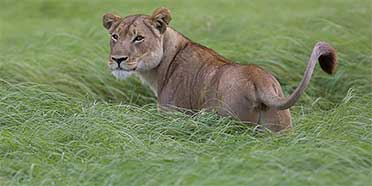An astounding bush experience marked by spectacular wildlife...like living in an IMAX movie!
Although technically the most rustic of the places we stayed, our camp in Musanza was situated in an idyllic riverbank setting, and was surrounded by mopane (which actually look similar to ironwood trees and were unknown to us, although they are rather common in the area) and checkerwood trees. It ended up surpassing our expectations and was our favorite of all the camps we have visited. The staff were wonderful and the cook was great; the food was superb. There was something amazing about having the opportunity to lounge in collapsable "director's chairs" just outside our tent before high tea in the late afternoon, watching the exotic birds in the tree and vines, reading, or occasionally seeing or hearing hippos splash in the Lufupa river fifty feet away.
Yes, hearing hippos. I had never before thought about hippos making noise, but they actually make a very distinctive (and rather loud) sound that marked our days and nights and that we had never before experienced. It is an expansive and deep laughing sound, as if someone had recorded a guffaw and then played it back --much louder-- at a slower speed. At the risk of dating myself, I would liken it to a 45 rpm record being played back at 33 rpm. The hippos frolic and splash in the water, submerge themselves for a few minutes, then resurface and bellow out HOOOO HAR HAR. (One person in our group posited that they go under the water to share fart jokes, then come back to the surface to laugh over them. If you ever have the chance to hear this sound you will find this explanation strangely.
The beasts splash around in the water, submerge for a minute or two, then surface and call out HOOOOO HAR HAR HAR. (One wag in our tour group suggested that they go underwater to tell fart jokes, then surface to laugh at them. If you ever get to hear this sound you will find that theory strangely conceivable.)
We really wanted to walk that fifty feet and sit on the river bank, but were told to keep a distance of at least ten feet from the water at all times, since that is the striking point of the crocodiles who share the water with the hippos. We did not need to be instructed on this twice.
One of Musanza's afternoon activities was a boat ride up the river that lasted a few hours, in an outboard aluminum skiff that accommodated roughly seven. There was a plethora of birds, and as we meandered up river our boat driver made sure to maneuver around the hippos. You would think since the hippos are fairly large targets that this might be an easy task, however, since they occupy a fair amount of time underwater is more difficult (and more dangerous) than it appears. There were times when he would spot bubbles further down the river and would simply steer us in a compact circle for a few minutes until the underwater hippos had vacated. There was an occasion where he misjudged, and a hippo reared just under the surface about two feet to the left of the rig, causing a huge ripple and provoking a not entirely uncalled for shout from a woman who had the distinction of sitting right at that point of the boat.
Hippos look funny, and their laugh adds to that picture, but they are genuinely dangerous because of their inclination for capsizing boats. They are close to the top of the list of large animals that routinely cause human deaths. (This being around here of course; there are not very many hippo-related casualties in our neighborhood). They are also threatening to each other, with a social structure that features a lot of the alpha-male, "are YOU lookin' at ME?" stuff. A couple miles upstream from our camp on the river bank, we happened upon a severely injured young male hippo limping through the brush and into the river. He had a nasty wound on his left rear flank, which most likely arose from a brush with the wrong adult male.
A stop at the Treetops school was including on our boat trip. This school is where more affluent parents, mostly from the capital Lusaka, send their children for four to five days of seeing the animals, living in the bush, etc. It is basically a summer camp featuring elephants. There was a larger variety of ethnic diversity than we expected (Indian, black, and white), until we were given the explanation behind "affluent": these were al children of the diplomats and other "upper crust" in Lusaka. The school had a classroom and separate, camp-style dorm buildings, and was situated in a clearing close by the riverbank. The setting was dominated by a giant baobab tree, which also merits some discussion.
If you have ever studied French in school then you probably read "The Little Prince," By St. Exupéry, in which case you have already conjured up a mental image of a baobab tree as a vine-draped thing that has roots drooping from all its branches and thus spreads itself over a very wide area. Well, delete that image because St. Exupéry was entirely wrong in confusing a baobab tree with a banyan. A baobab is defined by a very wide trunk and comparatively thin branches - in fact, it looks as if someone chopped off all the branches from a much older tree and they have only been growing back over the past couple years. The trunks are of such great diameter that in old times poorer residents of the village would hollow them out and use the still living tree as a home; in some instances the community would use them as prisons. The baobab at Treetops could probably have served as a small maximum security jail: the tree was roughly 150' high and easily 25'-30' wide at its base. (We have a picture of us standing at the base - it's so big that you have to look two times to see us.)
We left Musanza (and Zambia) with heavy hearts; it had truly been an Edenic three days and we really bonded with the staff there (it probably didn't hurt that we were the only guests). As seems to be the standard procedure at every camp we have visited, the last night included musical performance by the staff, a lively drum display that had everyone up on their feet.

![11-Day Best of Zambia's Wildlife Safari]()

![6-Day Budget Camping Safari Through Kafue National Park]()

![5-Day Safari Serenity in Kafue]()


 Zambia Parks
Zambia Parks













